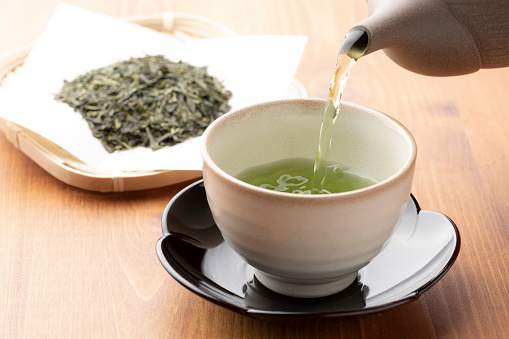Grab a cuppa! How drinking TEA can boost your life expectancy and overall health
- Replies 5
Although coffee is the most common beverage that youngsters turn to for their daily dose of caffeine, scientists believe that drinking tea is a better choice after discovering that it reduces the odds of an early grave.
A study conducted by the US National Institutes of Health found that those who consumed two or more cups of tea daily were 13 per cent less likely to die from any cause.
The experts analysed data from around 500,000 people in the UK Biobank. Eighty-five per cent of the participants aged 40 to 69 said that they regularly drank tea. Among them, nine in 10 said that they mostly consumed black tea.
Compared to non-tea drinkers, participants who consumed two or more brews each day had a 9 to 13 per cent lower risk of dying at the time. Even better, the protective effect remained regardless of the participants’ genes, the tea’s temperature, and whether or not sugar or milk was added.

If you’re a fan of drinking tea, you’re in for a treat! Source: Unsplash
The researchers said that their findings suggest that drinking tea regularly can be a part of a healthy and balanced diet. However, it’s worth noting that the observational study cannot prove that tea was behind the lower mortality risk and not external factors.
Professor Fernando Artalejo, a public health expert who isn’t involved in the study, said that the findings represented ‘a substantial advance in the field'.
He explained that most studies about tea and its health benefits were conducted in Asia, where green tea is more popular. Similar studies in the West were 'smaller in size and had inconclusive results'.
'The latest research showed that regular consumption of black tea is associated with a modest reduction in total and, especially, cardiovascular disease mortality over 10 years in a middle-aged, mostly white, adult general population.’ the Professor said.
'Studies should be done with repeated measurements of tea consumption over time. They should compare the mortality of those who do not consume tea on a sustained basis with that of those who have started to consume tea or have increased their consumption over time, as well as those who have been drinking tea for years.'

Most studies about tea were conducted in Asia. Source: Unsplash
The experts claimed that their findings are among the most comprehensive ones yet as the study involved tea-loving Brits. The British consume roughly 100 million cuppas per day but its demand, especially among young people, has dropped in recent years.
Tea is a rich source of healthy plant compounds called polyphenols, which helps control the negative effects of cell-damaging molecules in the body. These benefits have been linked to a reduced risk of many chronic diseases including heart disease and dementia.
They may also have positive impacts on brain function, bone density, and mental well-being.
A recent study done by Australian researchers discovered that drinking black tea regularly reduced the risk of coronary heart disease and strokes by 10 to 20 per cent. Caffeine in tea is also thought to stimulate the release of digestive hormones that help keep the gut healthy.
Are you a fan of drinking tea? Which one, in particular, is your favourite and how do you like your cuppa? Share your thoughts with us in the comments!
Learn how else drinking tea can benefit you by watching the video below:
Source: Healthline
A study conducted by the US National Institutes of Health found that those who consumed two or more cups of tea daily were 13 per cent less likely to die from any cause.
The experts analysed data from around 500,000 people in the UK Biobank. Eighty-five per cent of the participants aged 40 to 69 said that they regularly drank tea. Among them, nine in 10 said that they mostly consumed black tea.
Compared to non-tea drinkers, participants who consumed two or more brews each day had a 9 to 13 per cent lower risk of dying at the time. Even better, the protective effect remained regardless of the participants’ genes, the tea’s temperature, and whether or not sugar or milk was added.
If you’re a fan of drinking tea, you’re in for a treat! Source: Unsplash
The researchers said that their findings suggest that drinking tea regularly can be a part of a healthy and balanced diet. However, it’s worth noting that the observational study cannot prove that tea was behind the lower mortality risk and not external factors.
Professor Fernando Artalejo, a public health expert who isn’t involved in the study, said that the findings represented ‘a substantial advance in the field'.
He explained that most studies about tea and its health benefits were conducted in Asia, where green tea is more popular. Similar studies in the West were 'smaller in size and had inconclusive results'.
'The latest research showed that regular consumption of black tea is associated with a modest reduction in total and, especially, cardiovascular disease mortality over 10 years in a middle-aged, mostly white, adult general population.’ the Professor said.
'Studies should be done with repeated measurements of tea consumption over time. They should compare the mortality of those who do not consume tea on a sustained basis with that of those who have started to consume tea or have increased their consumption over time, as well as those who have been drinking tea for years.'
Most studies about tea were conducted in Asia. Source: Unsplash
The experts claimed that their findings are among the most comprehensive ones yet as the study involved tea-loving Brits. The British consume roughly 100 million cuppas per day but its demand, especially among young people, has dropped in recent years.
Tea is a rich source of healthy plant compounds called polyphenols, which helps control the negative effects of cell-damaging molecules in the body. These benefits have been linked to a reduced risk of many chronic diseases including heart disease and dementia.
They may also have positive impacts on brain function, bone density, and mental well-being.
A recent study done by Australian researchers discovered that drinking black tea regularly reduced the risk of coronary heart disease and strokes by 10 to 20 per cent. Caffeine in tea is also thought to stimulate the release of digestive hormones that help keep the gut healthy.
Are you a fan of drinking tea? Which one, in particular, is your favourite and how do you like your cuppa? Share your thoughts with us in the comments!
Learn how else drinking tea can benefit you by watching the video below:
Source: Healthline







